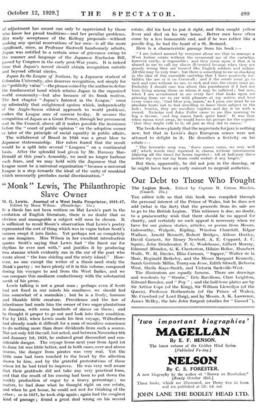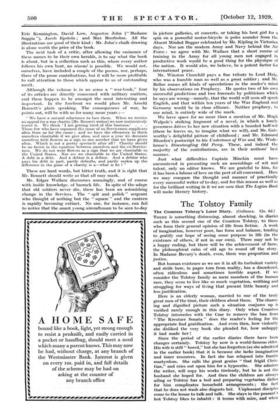Our Debt to Those Who Fought
The Legion Book. Edited by Captain H. Cotton Minchin. (Cassell. 21s.) THE editor tells us that this book was compiled through the personal interest of the Prince of Wales, but he does not add (what is the fact) that the proceeds from its sale are to go to the British Legion. This reticence is due, no doubt, to a praiseworthy wish that there should be no appeal for charity, and certainly no such appeal is necessary when we have for our guinea stories, articles, or poems from Messrs. Galsworthy, Walpole, Kipling, Winston Churchill, Edgar Wallace, Arnold Bennett, Robert Bridges, Aldous Huxley, David Garnett, Sir Henry Newbolt, A. E. Coppard, J. C. Squire, John Drinkwater, P. G. Wodehouse, Gilbert Murray, Edmund Blunden, G. K. Chesterton, Hilaire Belloc, Humbert Wolfe, W. H. Davies, Bliss Carman, " Sapper," Walter de la Mare, Reginald Berkeley, and the Misses Margaret Kennedy, Sarah Gertrude Millin, Tennyson Jesse, Edith Sitwell, Rebecca West, Sheila Kaye-Smith, and Victoria Sackville-West.
The illustrators are equally famous. There are drawings and woodcuts by " Strube," Eric Ravilions, Clare Leighton, Edward Bawden, and " Poy " ; and the half-tone plates are by Sir Arthur Cope (of the King), Sir William Llewellyn (of the Queen), Professor Rothenstein (of the Prince of Wales), Mr. Crawford (of Lord Haig), and by Messrs. A. K. Lawrence, James MeBey, the late John Sargent (studies for " Gassed "), Eric Kennington, David Low, Augustus John (" Madame Suggia "), Jacob Epstein ; and Max Beerbohm. All the illustrations are good of their kind : Mr. John's chalk drawing is alone worth the price of the book.
The next task of a critic, after allowing the eminence of these names to be their own heralds, is to say what the book
is about, but in a collection such as this, where every author follows his own bent, no résumé is possible. We would not, ourselves, have included a couple of the poems, nor, perhaps, three of the prose contributions, but it will be more profitable
to call attention to those which appear to us of outstanding merit.
Although the volume is in no sense a " war-book," four of its articles are directly concerned with military matters, and these happen to be amongst the most interesting and important. In the forefront we would place Mr. Arnold Bennett's plain speaking. The consequences of war, he points out, will be with us for many more year :—
" We have a natural reluctance to face them. When we receive an appeal for a war charity [Mr. Bennett writes] we now instinctively resent it. We think ' I am getting tired of this business.' . . . Those few who have espoused the cause of ex-Servicemen supplicate alms from us for the cause ; and we have the effrontery to think ourselves charitable if we give alms, and once a year we decorate ourselves with flowers as a sign to ono another that we have given alms. Which is not a pretty spectacle after all ! Charity should be no factor in the equation between ourselves and the ex-Service- men. We do not wear flowers as a sign that we are charitable to the United States. Nor are we charitable to the United States. A debt is a debt. And a debtor is a debtor. And a debtor who pays his debt in part, partly defaults, and partly makes up the difference in the guise of a charity is a—what is he ? "
These are hard words, but bitter truth, and it is right that Mr. Bennett should write so that all may mark.
Mr. Edgar Wallace discourses amusingly, and of course with inside knowledge, of barrack life. In spite of the adage that old soldiers never die, there has been an astonishing change in the Services. The " spit and polish " sergeant who thought of nothing but the " square " and the canteen is rapidly becoming extinct. No one, for instance, can fail to notice that the smart young aircraftsman to be seen to-day
in picture galleries, at concerts, or taking his best girl for a spin on a powerful motor-bicycle is poles asunder from the Absent Minded Beggar celebrated by Mr. Kipling in Victorian days. Nor are the modern Army and Navy behind the Air Force : we agree with Mr. Wallace that a short course of training in the Army for all young men not eogaged in productive work would be a good thing for the physique of the nation. It would also, we believe, be- a potent factor for international peace. .
Mr. Winston Churchill pays a fine tribute to Lord Haig, who was a humble man as well as a great soldier ; and Mr. Belloc rouses all kinds of speculations in the reader's mind by his observations on Prophecy. He quotes two of his own successful predictions and two forecasts by politicians which he says are wrong—namely, that the world will soon all speak English, and that within ten years of the War England and Germany would be in close alliance. Neither prophecy, to our mind, is entirely wide of the mark.
We have space for no more than a mention of Mr. Hugh Walpole's striking fragment of a novel, in which a lonely governess drives to her new situation with a bearded half-wit (there he leaves us, to imagine what we will), and Mr. Gals- worthy's delightful picture of childhood ; and Mr. Edmund Blunden's postscript to his Undertones of War and Mr. Wode- house's Disentangling Old Percy. These, and indeed the majority of the contributions, are in their authors' best manner.
Just what difficulties Captain Minchin must have encountered in presenting such an assemblage of wit and talent, only an editor knows. We are grateful to him, for it has been a labour of love on the part of all concerned. Here we may compare the thought and manner of practically every successful writer of to-day, and for this reason as well as for the brilliant writing in it we are sure that The Legion Book will make literary history.









































 Previous page
Previous page